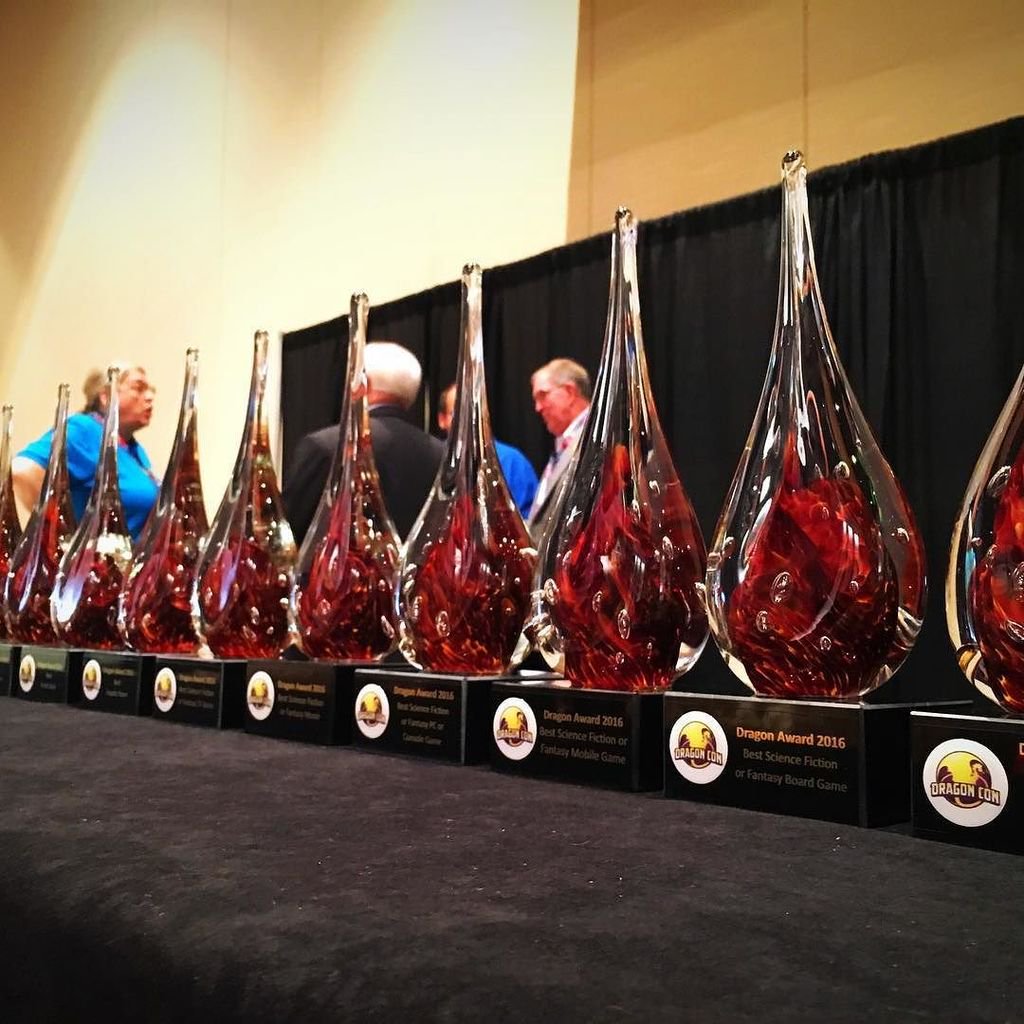
Yesterday the 2020 Dragon Awards ballot dropped, pleasantly surprising many by being loaded with genuinely popular books. (As Cora Buhlert put it, “The 2020 Dragon Award Finalists Go Full Tilt Towards Mainstream Respectability”). But not everyone is pleased.
Tommy Lasorda famously said, “There are three kinds of people in this world: people who make it happen, people who watch what happens, and people who wonder what happened.” And this year, some of the Dragon Awards’ most vocal supporters find themselves in the third category.
Declan Finn, a Sad Puppies devotee whose passion went unappreciated by the movement’s leaders, considers the 2020 Dragon Ballot to be another outcome of people not listening to him.
You know, I am fairly hooked into the book community. If I don’t read every book, I at least hear about a lot of them. Even if I take one look and decide I don’t want to read it, I at least check it out.
Then I saw the 2020 Dragon Award ballot and wondered who the fuck any of these people were. Seriously, what sort of shit show is this?
Sure, I’ve heard of a few. Margaret Atwood at least has a TV show. She’s an opportunistic parasite, but people have at least heard of her (though I haven’t heard of that book. I guess she came out with another). I’ve heard of Scalzi–don’t like him, but I can at least pick his name out of a phone book. Chuck Wendigo? The same.
But so many of these names are just … Who? What? Huh?
I’ve been assured by some people (randoms online, mostly) that these are Hugo authors. I guess I’ll take their word on it… but usually, I’ve at least HEARD about those authors. These folks? Nah.
… If only someone could have warned about this.
If only someone could have tried to lead discussions, hold conversations on what books came out. That way, we could have narrowed it down to a few.
If only…
WAIT! I know! I DID. I FUCKING WANTED PEOPLE TO DISCUSS BOOKS FOR THE DRAGONS. WHAT DID EVERYONE THINK I WAS DOING IN 2018 AND 2019? COMPILING EVERY ELIGIBLE BOOK BECAUSE IT WAS FUN? I DID IT FOR MY HEALTH? THAT WAS EXTRA WORK I DIDN’T NEED TO DO.
…It was especially fun this year when I had an author see that “I was talking about the Dragon again,” therefore, she asked if “I could put her book on the list.” IE: She didn’t even read the blog post to see what I was talking about. It was assumed I enjoyed killing myself so I could market their book for free.
No one wanted to play. That’s fine. I’m used to it.
But everyone can all stop bitching about it. They either didn’t vote, or didn’t want to talk about it. They didn’t want to invest even thirty minutes into presenting a selection of choices, or having a conversation.
Now this years ballot sucks….
Brian Niemeier in “The Dragon Sleeps” doesn’t think the reason is that they neglected Declan’s advice. After ranting about John Scalzi’s nomination, Niemeier says the pandemic is the reason that the award he’s spent years boosting, where EVERYONE can vote for FREE, has in 2020 generated a ballot bereft of work by him and his friends:
From the author of The Handmaid’s Tale to lesbian vampire stories to a writer so deranged even Disney fired him, this year’s Dragon ballot reads like the canon of Death Cult humiliation scripture….
Of course, the Death Cult witches lie constantly in the manner of their father below. Thus their previous attempt to take over the Dragons in 2017.
That attempt failed, and the Dragons continued to be a direct democratic process as intended. Each subsequent years’ winners were pretty much what you’d expect from a readers’ choice award with a broad voter base. Baen and the bigger indies came to dominate, with cameos from the more mainstream Pop Cult fare like Corey Doctorow and The Expanse.
I and the other cultural commentators who predicted this course of events based our forecasts on the key difference between the Dragons and the other literary awards. Anyone can vote in the former, while the latter lock voting rights behind a paywall or professional organization membership.
Put simply, the Death Cult can monopolize the Hugos because World Con’s voter base is quite small, relatively speaking. The number of CHORFs isn’t growing. In fact, they’re rapidly graying. It stands to reason that an award with an open, large, and growing voter base would be immune to manipulation by an insular Cult.
And for three years, that reasoning held true. But as is its wont, 2020 threw the con scene a curve ball: Corona-chan.
Niemeier tries to spin that the pandemic has caused these aberrant results because people won’t be able to attend an in-person Dragon Con this year. (Never mind that Brian is always telling readers one of the Dragon’s virtues is that you don’t have to buy a con membership to vote.)
…There’s your explanation for what happened with the Dragons. The virus shut down the con, normal people tuned out, and the small but relentless Cult faction took advantage of the drastically reduced voter base to pack the ballot.
Then, the following Twitter conversation was devoted to asking “What happened?”
In contrast, Larry Correia, inventor of Sad Puppies, hailed the 2020 ballot: “Fantastic! There are a bunch of really good authors nominated this year.”
And Brad R. Torgersen, who ran the last Sad Puppies slate, found the pandemic didn’t stop his friends from getting nominated: “Nice to see some friends getting some well-deserved recognition on the Dragons final ballot. Even though there is no DragonCon being held in Atlanta due to Covid-19 panic, the Dragons roar onward. Good luck to Nick and Jason, Marko, Dave, and Chris!”
As for the nominees, they’re delighted as you’d expect. John Scalzi says in “The Last Emperox a Finalist for the 2020 Dragon Awards” at Whatever.
It’s a field where I would be happy with any one of these writers/titles winning, so that’s really the best of all possible worlds. And it’s nice to see The Last Emperox getting some early recognition, award-wise. That would be lovely to have continue.
Fonda Lee is especially happy:
(She’s been up for a Nebula and won a World Fantasy Award (2018), neither of which, it’s true, would you call “fan awards,” however, she’s won three Aurora Awards, which I thought are run by fans; I’ll have to defer to her knowledge on that score.)
Meanwhile, even experienced sff news reporters like Ansible’s David Langford are still coming to grips with the Dragon Awards’ turnaround. He told Camestros Felapton:
I am of course utterly stupended. But this is a condition that comes easily to me.
You and me both, Dave. And count on you to know the best word for it.
Discover more from File 770
Subscribe to get the latest posts to your email.

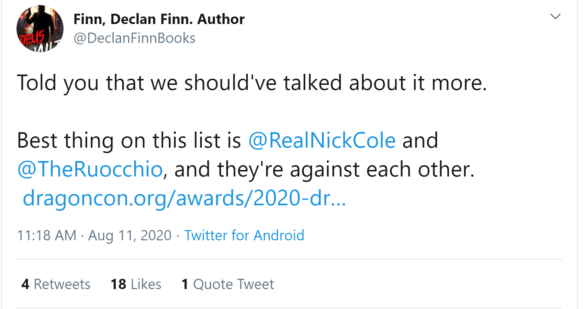
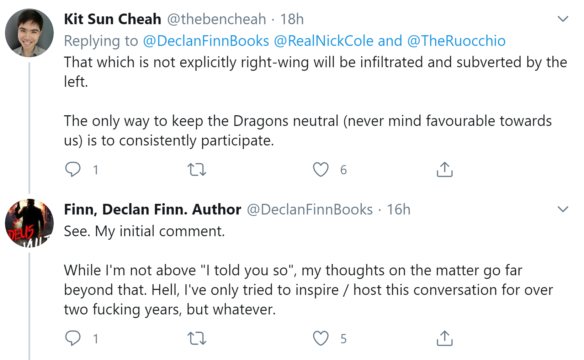
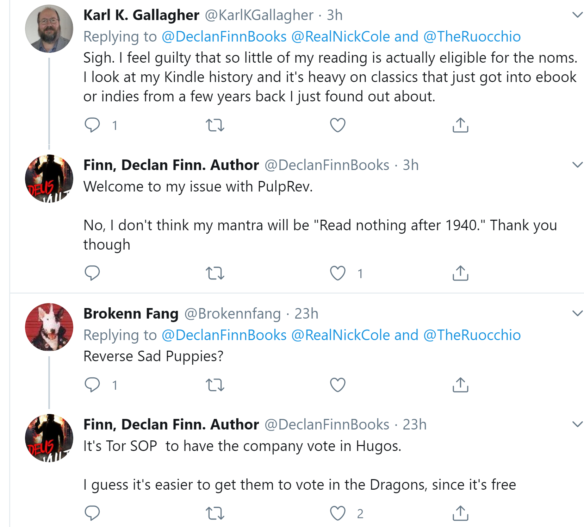
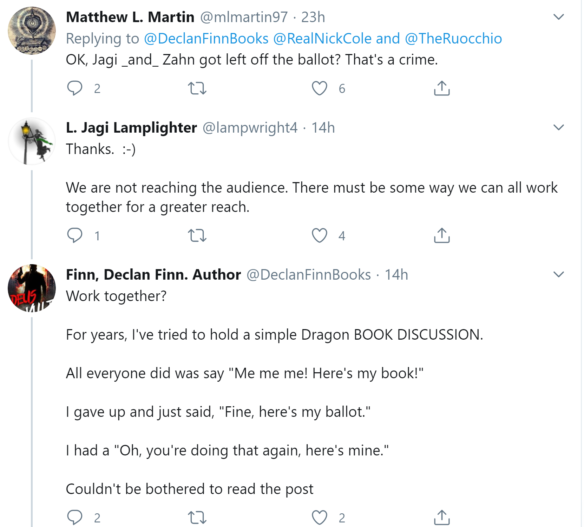
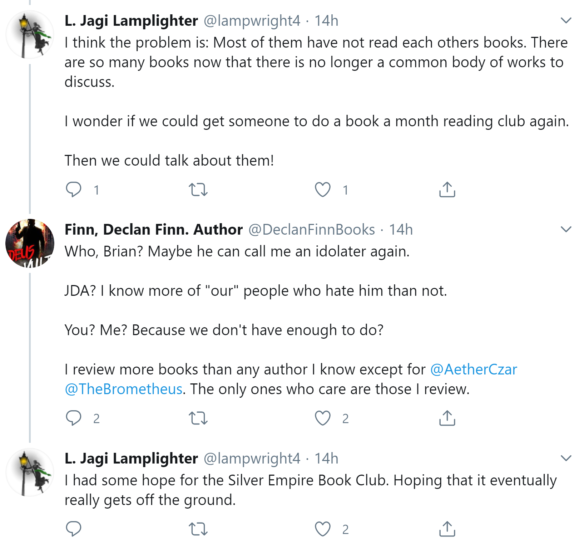
I honestly have no idea where these myths about Margaret Atwood come from.
I would be extremely surprised to find out that she has stated she’s never read any science fiction, given that she has written an entire nonfiction book of essays about science fiction, which discusses the influences on her work from H. G. Wells to Ursula K. Le Guin and beyond.
I would also be surprised to learn that she has written virtually nothing but science fiction, since it means I must have imagined reading Cat’s Eye, Alias Grace, The Robber Bride, The Edible Woman, Surfacing, Bodily Harm, and Life Before Man, as well as most of her short stories and poems.
Jon DeCles: These days that person is like to have had her/his taste derived from the tastes of professors of editing at colleges rather than the changing tastes of the readership.
The only people for whom this might be true is for students majoring in literature — which is a tiny percentage of all university graduates.
The only taste my university professors succeeded in imposing on me was a profound interest in how computer hardware and software works — and much of that I went in with to begin with.
But I did get a good laugh out of your attempt to perpetuate the old “university professors are brainwashing students, and that’s the only reason they end up opposing racism and sexism and caring about other human beings!” canard. 😀
My English professors didn’t impose their tastes on me. They assigned me art to read and, with the rare exception, it was all glorious. Just not all to my tastes.
Money spent on publicity by publishers is still the dominant reality in getting a writer’s name well known. [citation needed]; there are so many reviews on the net that it’s not clear how much advertising helps. (Some net reviewers may pick up due to advertising; others get review copies.)
@Jon DeCles: *A person who can enforce personal taste on the masses will always be a dominant force. These days that person is like to have had her/his taste derived from the tastes of professors of editing at colleges rather than the changing tastes of the readership. [citation needed]; in addition to the debatable assertion about reviewers’ backgrounds, how do they enforce personal taste? I’ve never had the Books section of my newspaper grab me by the throat and say “You will read this!”
What you’re doing here is basic Limbaughism: claiming some unknown “elite” is somehow twisting the world.
Your citation of Tolkien is especially amusing. I remember ~54 years ago, when “Frodo Lives!” suddenly became a common graffito; the descriptions of the time made clear this was a word-of-mouth phenomenon, like Harry Potter was four decades later.
@Chip Hitchcock
Well hang on a sec.
Advertising is certainly a factor. Media companies would not advertise if it wasn’t effective to some measurable extent.
Getting a deal from a big publisher is certainly a factor because of the resulting presence in the market; including advertising. Review sites are a significant factor. Word-of-mouth is a significant factor.
It probably isn’t possible to quantify the effect of each of those factors. The inability to precisely measure their effectiveness doesn’t justify assuming that they have zero impact.
I agree with the general idea that advertising is not the only way to bring an author’s works to the attention of readers.
Regards,
Dann
To have peace with this peculiar life; to accept what we do not understand; to wait calmly for what awaits us, you have to be wiser than I am – M.C. Escher
Speaking just for myself, I can say that I’m more likely to seek out reviews of works I’ve heard about for other reasons (often via advertising) than I am to seek out random reviews. As a voracious reader, I do some of both, of course, but lots of people aren’t voracious readers as desperate for new material as I am.
@Kyra
I think the source of those myths is a BBC radio interview from years ago. At any rate, that’s where I traced the alleged “SF is about giant squids” remark. However, the interview is not available online, so until the BBC puts it online, we only have second hand remarks about what she supposedly said. And Margaret Atwood has clarified her remarks lots of times since then.
Margaret Atwood has also definitely read SFF, even long before she started writing a single word of fiction. She’s talked about reading superhero comics and pulp magazines as a kid in Canada and specifically mentioned Weird Tales.Not all of her works are SFF, but even the ones that aren’t occasionally contain SFF references. For example, The Robber Bride contains references to Doctor Who and The Shadow and the title is a Brothers Grimm reference.
I’m as annoyed as everybody else about literary writers who claim they don’t write SFF only to turn out the most hackneyed SFF plot imaginable. But save your ire for the folks who deserve it like Ian McEwan or Kazuo Ishiguro. Cause Margaret Atwood doesn’t deserve it.
@Xtifr: I almost never seek out reviews of specific books. I may ask specific people “Jo, what makes this interesting?” or “Andy, do you think I’d like that.”
I do sometimes read book reviews, but even when I seek them out, it’s rarely if ever looking for a review of a specific book . Looking at my reading log for the last year and a hal, everything that I read because I saw a review of it was nonfiction. Fiction was word-of-mouth, including people mentioning that so-and-so has a new book out, as well as friends saying “this was weird and I liked it” (e.g. Buddy Holly is Alive and Well on Ganymede).
Advertising/marketing probably affects this, by influencing what gets reviewed, but I don’t know by how much.
I love how shocked and offended the Puppies are that a popularity-based award was won by books that are wildly popular.
Pingback: Reactions to the 2020 Dragon Awards Finalists or the Sound of Puppies Crying | Cora Buhlert
Pingback: 2020 Dragon Award Winners: Thousands Vote Despite Right-Wing Backlash - WWAC
Pingback: Pixel Scroll 9/7/20 A Elbereth Gilthoniel, Silivren Penna Pixel Scroll | File 770